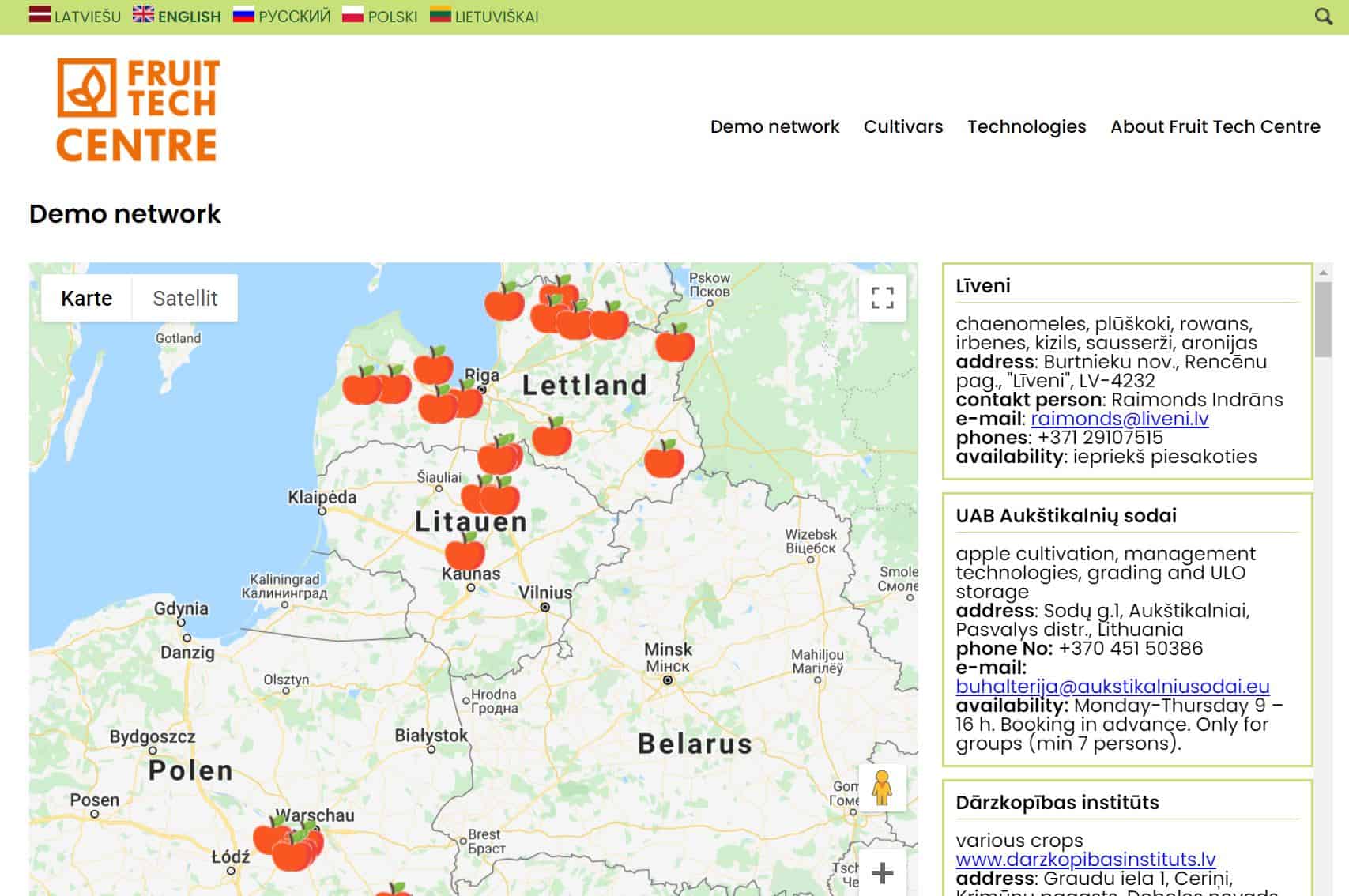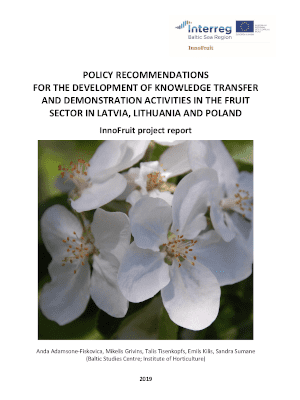InnoFruit
Fruit-growing sector with high potential
Fruit-growing industry demonstrates high potential for further development in the Baltic Sea region due to an expanding demand for healthy food.
Poland is one of the largest fruit-growers in Europe with around 4 million tons of fruit and berries produced on average every year. The best practices of the Polish fruit sector could efficiently be replicated in Latvia and Lithuania, and help them open up to new markets or to reposition their products. However, despite the high level of research in Latvia and Lithuania, the transfer of knowledge and innovation, both technological and non-technological, is limited due to the lack of advisory systems, slow development of fruit-growing cooperatives, and low absorptive capacity of small and medium sized enterprises (SMEs).
Sharing best practices across borders
In order to boost innovative capacity, especially in the areas of processes, organisation, and marketing innovations, owners of small and medium sized enterprises (SMEs) need to find ways to exchange knowledge and learn about best practices from other countries. Testing and implementing innovative solutions successful in one country are likely to work in another. This needs to be complemented with better tailored services offered by research organisations.
Budgets
in numbers
-
1.50MillionTotal
-
1.27MillionErdf
-
0.00MillionEni + Russia
-
0.00MillionNorway
Achievements
Sustainable network for sustainable production
InnoFruit has established an open demo-farm network, which includes 22 research organisations and small and medium sized enterprises (SMEs). 12 members of the network from Latvia, five from Lithuania and five from Poland signed agreements on their responsibilities, obligations and eligibility requirements. The network ensures the future transfer of practical knowledge and skills, either through peer-to-peer learning among fruit-growers within and across the countries, or through researcher-farmer cooperation, on e.g. farm trials, testing and demonstration of new technologies.
New knowledge on demand
So far, 550 SMEs acquired new knowledge during cross-country visits to the demo farms, but also at consultations, trainings and seminars. They learned about good practices and the practical implementation of, for example, devices to process and store fruits and berries, or equipment to sterilise bottles for juice.
The project also created recipes for healthy products with reduced sugar and increased fibre, as well as a mobile application “Resistant apples” for the Latvian market, which shows cultivar-specific information, such as growing characteristics, appearance, composition, possible ways of usage and resistance to potential diseases.
From growing fruit to affecting policies
InnoFruit compiled recommendations for policy makers, in particular national ministries, in order to help them further develop common agricultural policies in Latvia, Lithuania and Poland. Among other things, the project recommends a balanced regional coverage of independent full-time advisors in fruit growing as part of a national advisory system, as well as financial and non-financial incentives for commercial farms to become involved in hosting on-farm demonstrations in fruit-growing. The recommendations were already communicated to the Ministry of Agriculture of Republic of Latvia.
The Interreg InnoFruit used EUR 1.27 million from the European Union to trigger exchange of knowledge and innovative solutions among fruit-growers in Latvia, Lithuania and Poland. This is how Interreg helps build trust across the borders and fosters a more competitive Baltic Sea region.
Outputs
Open demo farm network

Recommendations for policy makers of fruit growing sector

Project Stories
-
20.12.2016
Access to research and cross-border cooperation key motivators for small companies to join projects
The InnoFruit Project (Advancement of non-technological innovation performance and innovation capacity in the fruit growing and processing sectors in selected Baltic Sea countries) recently kicked-off in Dobele, Latvia. One of the project partners, Berry Plus Ltd, represented by its marketing manager Ms Ilze Sauškina, was interviewed about the company’s motivation to join an Interreg Baltic Sea Region Project.Read full story
Partners
Institute of Horticulture, Latvia University of Agriculture
- TownDobele
- RegionZemgale
- CountryLatvia
- RepresentativeEdgars Rubauskis
- Phone
- E-Mail
- Web
Lithuanian Research Centre for Agriculture and Forestry
- TownAkademija, Kedainiai distr.
- RegionKauno apskritis
- CountryLithuania
- RepresentativeDarius Kviklys
- Phone
- E-Mail
- Web
Research Institute of Horticulture
- TownSkierniewice
- RegionSkierniewicki
- CountryPoland
- RepresentativeMiroslaw Sitarek
- Phone
- E-Mail
- Web
Latvian Fruit Growers' association
- TownRiga
- RegionRīga
- CountryLatvia
- RepresentativeRenāte Kajaka
- Phone
- E-Mail
- Web
Swedish Pomological Science Center
- TownKågeröd
- RegionSkåne län
- CountrySweden
- RepresentativeKarin Trajkovski
- Phone
- E-Mail
- Web
La-Sad Ltd.
- TownBłędów
- RegionRadomski
- CountryPoland
- RepresentativeKinga Szymańska
- Phone
- E-Mail
- Web
Latvia University of Agriculture
- TownJelgava
- RegionZemgale
- CountryLatvia
- RepresentativeDace Šterne
- Phone
- E-Mail
- Web
Berry plus Ltd.
- TownVireši
- RegionVidzeme
- CountryLatvia
- RepresentativeSergejs Sauškins
- Phone
- E-Mail
- Web
-
Project managerIlze LesiņaInstitute of Horticulture
-
Legal representativeInese EbeleInstitute of Horticulture, Latvia University of Agriculture
-
Financial managerInga SazonovaInstitute of Horticulture
-
Communication managerEdite KaufmaneLatvia State institute of Fruit Growing



